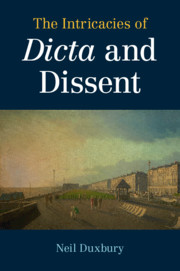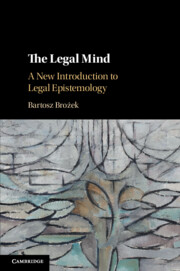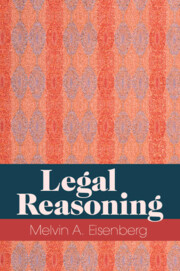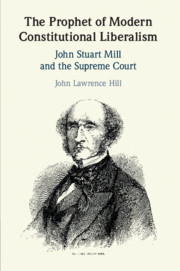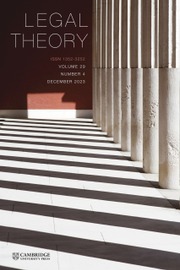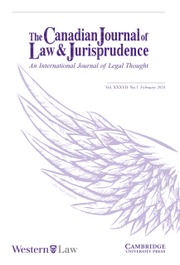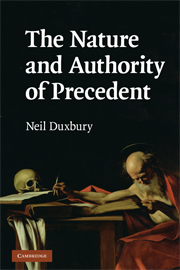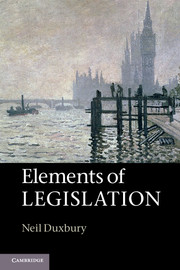The Intricacies of Dicta and Dissent
$41.99 (P)
- Author: Neil Duxbury, London School of Economics and Political Science
- Date Published: August 2021
- availability: Available
- format: Paperback
- isbn: 9781108794886
$
41.99
(P)
Paperback
Other available formats:
Hardback, eBook
Looking for an examination copy?
If you are interested in the title for your course we can consider offering an examination copy. To register your interest please contact [email protected] providing details of the course you are teaching.
-
Common-law judgments tend to be more than merely judgments, for judges often make pronouncements that they need not have made had they kept strictly to the task in hand. Why do they do this? The Intricacies of Dicta and Dissent examines two such types of pronouncement, obiter dicta and dissenting opinions, primarily as aspects of English case law. Neil Duxbury shows that both of these phenomena have complex histories, have been put to a variety of uses, and are not amenable to being straightforwardly categorized as secondary sources of law. This innovative and unusual study casts new light on – and will prompt lawyers to pose fresh questions about – the common law tradition and the nature of judicial decision-making.
Read more- Draws on a diverse array of materials from different periods and jurisdictions, introducing lawyers and historians to hitherto neglected legal sources
- Considers the history of dicta and dissent as types of judicial pronouncement, demonstrating how the concept of legal authority is highly nuanced, and how a legal system's rule of recognition can be altered by judges
- Provides a detailed examination of the main types of non-binding content to be found in legal judgments
Awards
- Co-winner, 2022 The Inner Temple Book Prize, The Inner Temple
Reviews & endorsements
‘Professor Duxbury provides us with a wealth of scholarship and some valuable insights into two aspects of judging which have not received much attention to date. In particular, he shows us how the two are inter-related - all dissents being essentially obiter dicta - and debunks the myth that today’s dissent is tomorrow’s orthodoxy - although I hope that it is not always a myth.’ Brenda Hale, the Baroness Hale of Richmond, former President of the Supreme Court of the United Kingdom
See more reviews‘A very thoughtful discussion of two aspects of judicial practice which deserve more attention, exploring how obiter dicta are used to fit an individual case into a wider principled legal scheme and what moves judges to write dissents. It encouraged me to reflect more deeply about my own judicial writing.’ Philip Sales, Justice of the Supreme Court of the United Kingdom and the Judicial Committee of the Privy Council
‘In these twin essays of breathtaking range and erudition, Neil Duxbury illuminates two largely unstudied ways in which judges contribute to the common law by expressing views that create no binding precedent. Anyone interested in the craft of judging will be wiser, as well as hugely well informed, after reading this book.' George Leggatt, Justice of the Supreme Court of the United Kingdom
‘Advocates and judges constitute a small minority of the legal profession. But they and others will be rewarded by reading this attractive, succinct monograph, which is an exemplary and insightful study into under-appreciated aspects of the craft of judgment writing and legal argument…. It is difficult to imagine readers who would not emerge wiser from reading the account of the changing attitudes to majority decisions of multi-member courts.’ Mark Leeming, Judge of Appeal, Supreme Court of New South Wales, Cambridge Law Journal
‘Anyone writing on either dicta or dissent shall firmly stand upon the shoulders of this book.’ Elijah Granet, Notes on the Style of the Law
'I warmly recommend this lepidum novum libellum. Its charm is different from that of Catullus, but it is immensely readable, and readers will be richly rewarded.' Mark Leeming, Cambridge Law Journal
Customer reviews
Not yet reviewed
Be the first to review
Review was not posted due to profanity
×Product details
- Date Published: August 2021
- format: Paperback
- isbn: 9781108794886
- length: 278 pages
- dimensions: 229 x 152 x 14 mm
- weight: 0.4kg
- availability: Available
Table of Contents
Preface
Table of cases
Prologue
Essay I. Dicta: introduction
1. The civilian dimension
2. Case law as common law
3. 'Obiter' as legal entity
4. Dicta depicted
5. Oblique strategies
6. Engines of confusion
7. The necessity test
8. Cheap talk
9. Dicta and dicta
10. Nearly law?
11. Observation and authority
12. The sources problem
Essay II. Dissent: introduction
13. Some preliminary observations on dissent
14. The nature of judicial dissent
15. Without contraries is no progression?
16. Stalemates and motivations
17. Dissents, decisions, and courts
18. The tug of unanimity in England's courts
19. Dissent in an apex court
20. When is a dissent not a dissent?
21. Minorities as authorities
22. Are we agreed?
Index.
Sorry, this resource is locked
Please register or sign in to request access. If you are having problems accessing these resources please email [email protected]
Register Sign in» Proceed
You are now leaving the Cambridge University Press website. Your eBook purchase and download will be completed by our partner www.ebooks.com. Please see the permission section of the www.ebooks.com catalogue page for details of the print & copy limits on our eBooks.
Continue ×Are you sure you want to delete your account?
This cannot be undone.
Thank you for your feedback which will help us improve our service.
If you requested a response, we will make sure to get back to you shortly.
×
